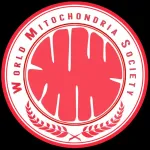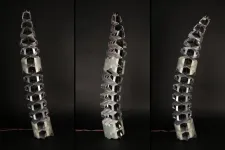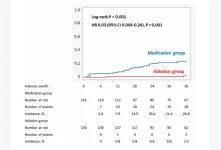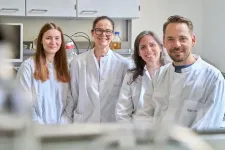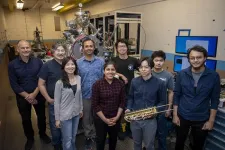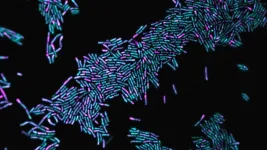(Press-News.org) SAN ANTONIO (Aug. 22, 2023) — The University of Texas Health Science Center at San Antonio (also called UT Health San Antonio) and seven regional collaborators will leverage $46 million from the National Institutes of Health (NIH) over the next five to seven years to translate scientific discoveries into therapeutic benefits for human health and well-being.
A key focus will be reducing health disparities among Mexican Americans, active military personnel and veterans.
William L. Henrich, MD, MACP, president of UT Health San Antonio, announced the funding from the NIH Clinical and Translational Science Awards (CTSA) Program today. Henrich thanked partners including The University of Texas at Austin Dell Medical School and College of Pharmacy, The University of Texas at San Antonio and the Texas Biomedical Research Institute for supporting the CTSA application. NIH’s National Center for Advancing Translational Sciences (NCATS) is the awarding agency.
The San Antonio Metropolitan Health District, San Antonio Military Health System, South Texas Veterans Health Care System and University Health are additional collaborators. “This is a consortium of talented individuals at significant institutions working together to ensure that, in the future, society will be transformed through clinical advances,” Henrich said.
Sizable impact
UT Health San Antonio, the coordinating center for the South-Central Texas CTSA Program hub, first gained CTSA funding in 2008 and successfully competed for grant renewals in 2013 and 2018. Combining the previous CTSA awards and supplements with the new grants, the cumulative NIH investment in South and Central Texas through the CTSA program is projected to reach $126 million by 2030.
“Translational research has tended to focus on a particular disease, such as diabetes or lupus, and ask specific questions about causes, outcomes or interventions. With this new award, we will ask broader questions about clinical translational science, such as how to push ideas along toward national application in the clinic more quickly and effectively,” said Robert A. Clark, MD, professor of medicine and director of the Institute for Integration of Medicine & Science (IIMS), which administers the CTSA Program hub at UT Health San Antonio and interacts with the regional collaborators.
Removing barriers
“The goal will be to remove barriers that currently hinder the translation of scientific discoveries into new therapies for incurable diseases,” said Robert A. Hromas, MD, FACP, dean of the Joe R. and Teresa Lozano Long School of Medicine at UT Health San Antonio and vice president for medical affairs. “Securing CTSA funding for a fourth time is an extraordinary accomplishment for this team of experts in our region.”
“Translational science is about accelerating innovation to impact health, which will reduce disease and improve health,” said Jennifer Sharpe Potter, PhD, MPH, professor of psychiatry and behavioral sciences and vice president for research, UT Health San Antonio. “After 15 years of continuous funding, the additional seven years of NCATS funding reflects the quality of work conducted at UT Health San Antonio with our partners and collaborators and permits us to explore and develop strategies for the most critical challenges impacting health in South and Central Texas.”
Working side by side with communities
Seeking ways to reduce health disparities is a central theme of the South-Central Texas CTSA Program hub. Community engagement is crucial for this activity.
“We care so deeply about the South Texas community. Our researchers will work side by side with community members to plan future health programs and share scientific innovations in a way that is equitable, culturally tailored, actionable and reflective of local needs. The community voice will be omnipresent as we work together to reduce health disparities and build health equity,” said Amelie G. Ramirez, DrPH, MPH, professor and chair of population health sciences in the Long School of Medicine. She directs the Institute for Health Promotion Research and is associate director of cancer outreach and engagement at the Mays Cancer Center at UT Health San Antonio.
“This is a unique opportunity to truly engage the community to identify needs and build responsive health research, programs and communications that will make a difference in the lives of South Texans and serve as a model for other communities with large Latino populations,” Ramirez added.
Pilot grants
The Institute for Integration of Medicine & Science has offered pilot project awards since the first CTSA grant in 2008, typically $50,000 for one-year projects. The new expanded grant funding through 2030 will enable larger pilot projects supported over a couple of years at $125,000 to $150,000, said Kenneth M. Hargreaves, DDS, PhD, professor and chair of endodontics in the UT Health San Antonio School of Dentistry.
“These pilot grant awards are critical to developing the next generation of clinical translational scientists in South and Central Texas,” Hargreaves said. “The grants are specifically in the area of clinical translational science and ask how we can get answers more quickly and push ideas forward more effectively.”
Hargreaves, Potter, Ramirez and Clark together form the Multiple Principal Investigator group, which comprises the leadership of the UT Health San Antonio CTSA program.
Important partners
The inclusion of UT Austin, UTSA and Texas Biomed into the South-Central Texas CTSA Program hub is critical because their combined record of NIH grant support moved up the funding level by about $1 million a year compared with the amount that UT Health San Antonio would otherwise have received, Clark said.
“These partners provide input to our leadership and in some cases serve as co-leaders of one or another of the CTSA components,” Clark said. “They also are a source of talented students and junior faculty for the training and career development portions of the CTSA.”
The South-Central Texas hub recently received notice of T32 training grant funding and a K12 Mentored Career Development Award. These NCATS grants will enhance the hub’s educational offerings.
The Institute for Integration of Medicine & Science also runs a pair of degree programs in concert with UT Health San Antonio’s Graduate School of Biomedical Sciences. These are the Master of Science in Clinical Investigation (MSCI) program and the Doctor of Philosophy (PhD) in Translational Science program. Shorter, topic-related certificates are offered through the MSCI program, including in cancer prevention and data science.
The community engagement function includes translational advisory boards, which are county-level groups of stakeholders who meet monthly or quarterly to discuss unmet local health needs. The CTSA Program hub also supports practice-based research networks in which research questions emanate from observations made in physician, dentist and other practitioner offices.
About 60 biomedical research institutions across the nation currently receive CTSA funding. “We are glad to be part of NCATS’ vision for how the health and well-being of America can be improved through translational science and community engagement,” Hromas said.
UT Health San Antonio is currently the only academic medical center in Texas to have each of these recognitions: 1) Clinical and Translational Science Award, 2) National Institute on Aging-designated Alzheimer’s Disease Research Center (Glenn Biggs Institute for Alzheimer’s and Neurodegenerative Diseases in collaboration with UT Rio Grande Valley), and 3) National Cancer Institute-designated Cancer Center (Mays Cancer Center, home to UT Health San Antonio MD Anderson).
The University of Texas Health Science Center at San Antonio (UT Health San Antonio), a primary driver for San Antonio’s $44.1 billion health care and biosciences sector, is the largest academic research institution in South Texas with an annual research portfolio of more than $360 million. Driving substantial economic impact with its six professional schools, a diverse workforce of 7,900, an annual operating budget of $1.23 billion and clinical practices that provide 2.6 million patient visits each year, UT Health San Antonio plans to add more than 1,500 higher-wage jobs over the next five years to serve San Antonio, Bexar County and South Texas. To learn about the many ways “We make lives better®,” visit UTHealthSA.org.
Stay connected with The University of Texas Health Science Center at San Antonio on Facebook, Twitter, LinkedIn, Instagram and YouTube.
END
UT Health San Antonio, 7 collaborators garner $46 million from NIH to move discoveries into practice
Community engagement, career development, degree programs and pilot projects among Clinical and Translational Science Award activities
2023-08-22
ELSE PRESS RELEASES FROM THIS DATE:
Automate or informate? Firms must invest in specific types of IT to improve working capital management
2023-08-22
The management of working capital — or a firm’s current assets minus its current liabilities — aids organizations in making efficient use of their existing assets and maximizing cash flow.
The relationship between efficient working capital management and firm performance can be complex due to globally dispersed supply chains, number of suppliers and product variety, and technological uncertainty, among other factors.
New research from the University of Notre Dame shows that information technology represents a critical investment that ...
Stealth BioTherapeutics will spotlight latest advancements in mitochondrial medicine at Targeting Mitochondria 2023, Berlin
2023-08-22
BERLIN, Germany – Stealth BioTherapeutics, a front-runner in the world of mitochondrial medicine, is set to unveil its latest breakthroughs at the much-anticipated Targeting Mitochondria 2023 conference in Berlin this October.
Dr. David A. Brown, Vice President of Mitochondrial Research at Stealth BioTherapeutics, is slated to give an enlightening talk titled, “Translational insights from targeting mitochondria in rare diseases.” His presentation promises to provide insights into Stealth’s progress in clinical programs, with updates on their advancements in addressing rare mitochondrial diseases across several Phase 2/3 clinical trials. ...
MIT engineers use kirigami to make ultrastrong, lightweight structures
2023-08-22
Cellular solids are materials composed of many cells that have been packed together, such as a honeycomb. The shape of those cells largely determines the material’s mechanical properties, including its stiffness or strength. Bones, for instance, are filled with a natural material that enables them to be lightweight, but stiff and strong.
Inspired by bones and other cellular solids found in nature, humans have used the same concept ...
$1.7 million research project to examine how public schools identify learning disabilities
2023-08-22
A University of Houston researcher is launching a new study to examine how elementary schools across Texas and Florida identify specific learning disabilities in students, with the goal of improving processes so children with significant academic difficulties can succeed.
Jeremy Miciak, research associate professor of psychology at the University of Houston’s Texas Institute for Measurement, Evaluation, and Statistics, was awarded a $1.7 million grant from the National Center for Special Education Research at the Institute of Education Sciences, the research arm ...
Catheter ablation in very old patients with nonvalvular atrial fibrillation
2023-08-22
“To the best of our knowledge, this is the first study to have demonstrated the preventive effect of AF ablation on long-term AF-related cardiovascular events in very old patients with NVAF.”
BUFFALO, NY- August 22, 2023 – A new research paper was published in Aging (listed by MEDLINE/PubMed as "Aging (Albany NY)" and "Aging-US" by Web of Science) Volume 15, Issue 15, entitled, “Cardiovascular events and death after catheter ablation in very old patients with nonvalvular ...
Researchers decode new antibiotic
2023-08-22
More and more bacterial pathogens are developing resistance. There is an increasing risk that common drugs will no longer be effective against infectious diseases. That is why scientists around the world are searching for new effective substances. Researchers from the University of Bonn, the German Center for Infection Research (DZIF), Utrecht University (Netherlands), Northeastern University in Boston (USA) and the company NovoBiotic Pharmaceuticals in Cambridge (USA) now have discovered and deciphered the mode of action of a new antibiotic. Clovibactin is derived from ...
Wistar researchers discover potential target for gastric cancers associated with Epstein-Barr virus
2023-08-22
PHILADELPHIA—(August 22, 2023)—Now, scientists at The Wistar Institute have discovered a potential target for gastric cancers associated with Epstein-Barr Virus; study results were published in the journal mBio. In the paper, Wistar’s Tempera lab investigates the epigenetic characteristics of gastric cancer associated with the Epstein-Barr Virus: EBVaGC. In evaluating EBVaGC’s epigenetics — the series of biological signals associated with the genome that determines whether a given gene is expressed — the Tempera lab ...
Advances in quantum emitters mark progress toward a quantum internet
2023-08-22
– By Alison Hatt
The prospect of a quantum internet, connecting quantum computers and capable of highly secure data transmission, is enticing, but making it poses a formidable challenge. Transporting quantum information requires working with individual photons rather than the light sources used in conventional fiber optic networks. To produce and manipulate individual photons, scientists are turning to quantum light emitters, also known as color centers. These atomic-scale defects in semiconductor materials can emit single photons of fixed wavelength or color and allow photons to interact with electron spin properties in controlled ways.
A team ...
Scientists create 3D models of freshwater mussels to help save them from extinction
2023-08-22
Scientists and imaging specialists have teamed up to help save one of the world’s most endangered groups of animals: freshwater mussels. With funding provided by the U.S. Fish and Wildlife Service’s National Conservation Training Center, imaging experts will create 3D shell models based on specimens from the Florida Museum of Natural History and the Smithsonian Institution’s National Museum of Natural History.
Once complete, the models will be available online for free to educate the public about these amazing yet little-known creatures that ...
How bacteria surf cargo through the cell
2023-08-22
Bacteria live in nearly every habitat on earth including within soil, water, acidic hot springs and even within our own guts.
Many are involved in fundamental processes like fermentation, decomposition and nitrogen fixation. But scientists don’t understand a fundamental process within bacteria cells: how they organize themselves before division.
Driving vs. surfing
When cells divide the cell splits into two “daughter cells” with the same genetic material as the original cell.
During this process, the DNA and other cellular components replicate, and then this “cargo” ...
LAST 30 PRESS RELEASES:
Stem cells from human baby teeth show promise for treating cerebral palsy
Chimps’ love for crystals could help us understand our own ancestors’ fascination with these stones
Vaginal estrogen therapy not linked to cancer recurrence in survivors of endometrial cancer
How estrogen helps protect women from high blood pressure
Breaking the efficiency barrier: Researchers propose multi-stage solar system to harness the full spectrum
A new name, a new beginning: Building a green energy future together
From algorithms to atoms: How artificial intelligence is accelerating the discovery of next-generation energy materials
Loneliness linked to fear of embarrassment: teen research
New MOH–NUS Fellowship launched to strengthen everyday ethics in Singapore’s healthcare sector
Sungkyunkwan University researchers develop next-generation transparent electrode without rare metal indium
What's going on inside quantum computers?: New method simplifies process tomography
This ancient plant-eater had a twisted jaw and sideways-facing teeth
Jackdaw chicks listen to adults to learn about predators
Toxic algal bloom has taken a heavy toll on mental health
Beyond silicon: SKKU team presents Indium Selenide roadmap for ultra-low-power AI and quantum computing
Sugar comforts newborn babies during painful procedures
Pollen exposure linked to poorer exam results taken at the end of secondary school
7 hours 18 mins may be optimal sleep length for avoiding type 2 diabetes precursor
Around 6 deaths a year linked to clubbing in the UK
Children’s development set back years by Covid lockdowns, study reveals
Four decades of data give unique insight into the Sun’s inner life
Urban trees can absorb more CO₂ than cars emit during summer
Fund for Science and Technology awards $15 million to Scripps Oceanography
New NIH grant advances Lupus protein research
New farm-scale biochar system could cut agricultural emissions by 75 percent while removing carbon from the atmosphere
From herbal waste to high performance clean water material: Turning traditional medicine residues into powerful biochar
New sulfur-iron biochar shows powerful ability to lock up arsenic and cadmium in contaminated soils
AI-driven chart review accurately identifies potential rare disease trial participants in new study
Paleontologist Stephen Chester and colleagues reveal new clues about early primate evolution
UF research finds a gentler way to treat aggressive gum disease
[Press-News.org] UT Health San Antonio, 7 collaborators garner $46 million from NIH to move discoveries into practiceCommunity engagement, career development, degree programs and pilot projects among Clinical and Translational Science Award activities
